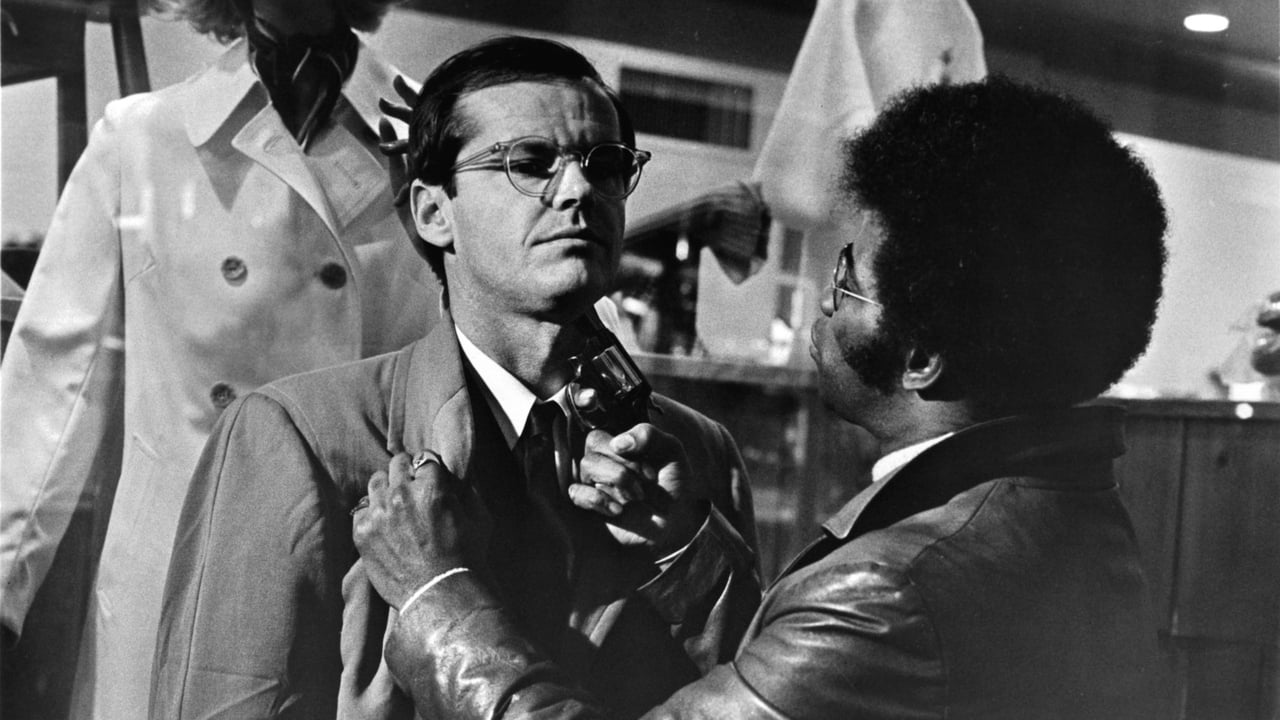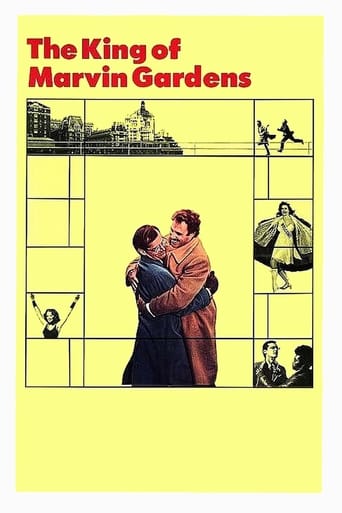

The King of Marvin Gardens like its predecessor "Five Easy Pieces" by the same director with Nicholson, isn't much of a film. A so called character study film, where nothing happens.Unfortunately I didn't know, otherwise I wouldn't of watched it. Anyway, the opening monologue by David was interesting, but the film was all down hill from there. The miss America pageant scene brought some joy, if only briefly. All the characters were mostly unlikable, Jason especially. Sally was the only one to show any real heart. It was all pretty pretentious, there wasn't anything here.
... View MoreThe King of Marvin Gardens opens with one of the most riveting monologues in cinema history. Nearly seven minutes of uninterrupted close-up, locked in with Jack Nicholson's faint frown and hypnotic, lugubrious voice impassively imparting a context-free tale of personal trauma, it's enigmatic, fascinating, and grimly impossible to tear away from. Naturally, within minutes, it's also debunked as utterly fictitious, and the punchline for a bitter joke which is nearly as bleak in itself. It's impossible to envision a better microcosmic teaser for the film to follow, as Bob Rafelson's follow-up to his incisive Five Easy Pieces is a perennial study of opposites: class and gaudiness, glum playfulness, quixotic, harsh realism, and fatalistic optimism. It's surreal enough that you struggle to trust any of it. But it's too magnetic for you to ever look away. Narrowly squeezing into the field of 70s con-movies before The Sting would take them by storm, Rafelson's Kingdom is just as sly, but as forlorn as its predecessor is bubbly (no bouncy ragtime score here). Putting the 'dreamy' in pipe-dream, Rafelson contrasts the opulent artifice of his expansive, seaside Atlantic City setting (shot, with astonishing beauty by legendary cinematographer László Kovács, as a barren, apocalyptic wasteland) and the grimy, small-time hustlers and their broken dreams of hoodwinking Japanese executives into investing in Hawaiian casinos therein. It's a slow, meditative, frequently silent snapshot of a small cast of characters progressively fraying into disillusionment and madness in their own ways, and it toes the line of alternatively being too sleepy or dour at times. Still, Rafelson keeps things chugging along with bursts of irreverent weirdness (a ramshackle train station pit band performance; a bombastic 'Miss America' pageant in an abandoned stadium), as if channelling a hungover, bankrupt Federico Fellini. And, as we discover here, that's not a bad thing to be. If there were ever a case to be made regarding Jack Nicholson's versatility as a performer, his extraordinary work here would be Exhibit A. His buttoned-down, depressed David Staebler is a remarkably muted, human performance. Only Staebler's flourishes in lyrical storytelling, whether his artistically maudlin radio dramas, or his more prosaic ditty about a woman teaching a dolphin to satisfy her sexually, show the glimmers of cheekiness that would become vintage Nicholson. Bruce Dern - in many ways playing the typical 'Jack' part as the wired, hustler brother - proves the perfect foil; cocksure and charismatic, but with an endearing 'aww shucks' affability, Dern delineates his sliminess as an almost unconscious defence mechanism, and is far more compelling for it. Supporting them, Ellen Burstyn is ferociously powerful as Dern's manic girlfriend. If The King of Marvin Gardens is an overall study of different methods of denial, Burstyn's is the most chilling and riveting, as she steadily crumbles into fits of frenzy by her inability to cope with her aging, including an unbelievably shocking but perfectly orchestrated climactic meltdown. Finally, Julia Anne Robinson (tragically in her only major film role) is exceptionally warm and charismatic as Burstyn's surrogate daughter, cheerily making peace with her warped life, while beloved character actor Scatman Crothers steals scenes as a kindly mobster with just the right undercurrent of unflinching menace. If The King of Marvin Gardens has a moral in its Kerouacian, magnetically loopy tale of perennially thwarted sad sacks, it's actually an unexpectedly earnest ode to the importance of adventure, no matter how macabre. So, should Rafelson's film prove an inspiration to break through creative block (as with Nicholson's Staebler), or merely an entertaining and moving curiosity, it's a perfect illustration of gripping, oracular 70s cinema, and the decade's obstinate defiance of easy closure. So go ahead: pass go, collect $200, and land on Marvin Gardens - it's worth taking the Chance (ouch). -8/10
... View MoreEver see a movie where you didn't like any of the characters? This movie is one of them. I know that in the early 70's, when it came out, I probably would have thought it "profound." In those days antinomianism, angst, the nihilism of the post-war nuclear threat, were still chic. The plays of Samuel Beckett were still fresh. And Hollywood was at the zenith of its "profound" era. I have re-viewed many movies from that time--movies I thought were so deep--and found them pretentious and wanting. I didn't see King of Marvin Gardens then, but I felt the same as during a recent viewing of The Deer Hunter, the first 2/3 of which were yawningly--guess I'll get a beer-- "profound." I won't see it again. So much of Nicholson's early work is so acidic I can no longer stand it. Five Easy Pieces? What a load of self-indulged artsy-fartsy hooey: the Nicholson character is so talented that he, like Zarathustra, comes down from the mountaintop, becomes a roughneck, takes up with a proletarian woman, and later selfishly says the hell with them both. (Sometime in the mid-80's I wrote him off until About Schmidt, where does a bang-up job.) In King of Marvin Gardens, he sounds like he's on the same bad pot-high, during his radio monologues, as he was in the camping scene in Easy Rider: talking about Venusians or...huh?. As for the rest of the cast: Bruce Dern, would do better in construction than acting; Ellyn Burstyn, really should have concentrated on organic gardening and psychoanalysis. The movie's real star was the backdrop of Atlantic City, then on hard times. All those old hotels and faceless old-folks who, no doubt, still remembered its heyday, were wonderful. They kept me through it to the end.
... View MoreIt's ironically indicative of this movie's theme and the relationship between American culture AND this film that the vast majority of IMDb raters have given this a 6 or 7 (out of 10). Most Americans that actually watch this film will be confused by it. Very strange, maybe, in that it is a truly American movie: American cast, American production, American themes, American sets, American problems, American answers. But, tell me--how do you rate yourself when you look back at that nude in the full length mirror right after you get out of the shower? If you're feeling generous (and you're only rating for yourself), you might get a 6 or a 7, right? Rafelson's early (funnier...haha, couldn't resist that), more critically successful Nicholson vehicle, FIVE EASY PIECES, has some really GREAT moments (like the toast-ordering scene), but ultimately, the pacing is off. There's just not enough there, there. Not so with King of MV. WOW, this is one helluva emotional roller coaster. The much, much underrated and underutilized Bruce Dern gives one of his best two or three performances as Nicholson's manic (American through and through) salesman brother. This riffs on Arthur Miller and all the best dramatic pitchmen roles from the 1st half of the 20th Century. Ellen Burstyn is spot on, as is the other female interest. But the real focus is on the guys. (And just a word about the late, great Scatman Crothers--so so excellent and iconic in this.) And now we get to Jack... ...I think this is arguably his best performance. It is one of the very very few where his eyebrows were nailed down, anyway. His character is so weary, so defeated, so human, you're tempted to think he's a Russian or a Jew or maybe even a Russian Jew. But no, he is a through and through Willie Loman American. And one we so rarely see on the stage or screen--though we all know/have known them. They are that vast minority of reasonable, intelligent, sensitive, fairly strong and honest and wise individuals who just can't take it or who just don't think it's worth the trouble having seen too many people taken advantage of or getting their teeth knocked out. They are sick of what they've seen; they are sick of not being able to toe the mark--even though they know that those expectations are unreasonable. Rare stuff, indeed.BTW, this is NOT a happy movie--fair warning.Bless you, Bob Rafelson--a brilliant, brilliant film that should rest on the shelf next to Renoir and the very best of the 50's British Angry Young Men cinema.
... View More